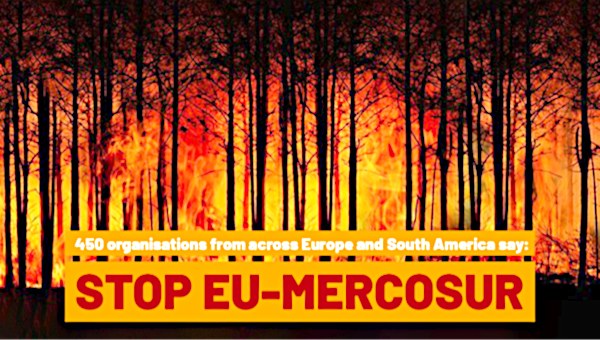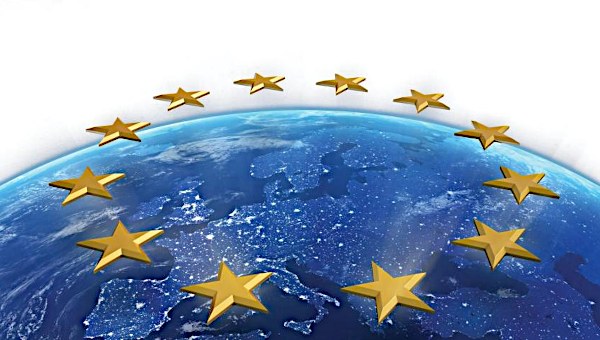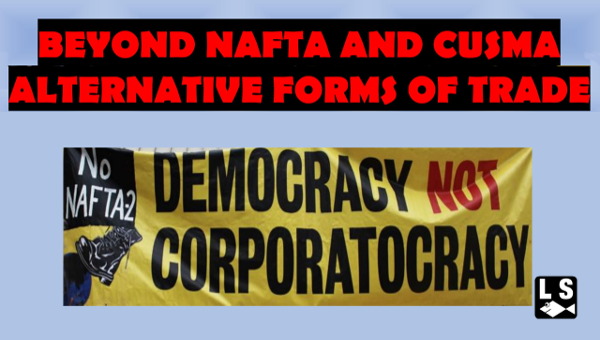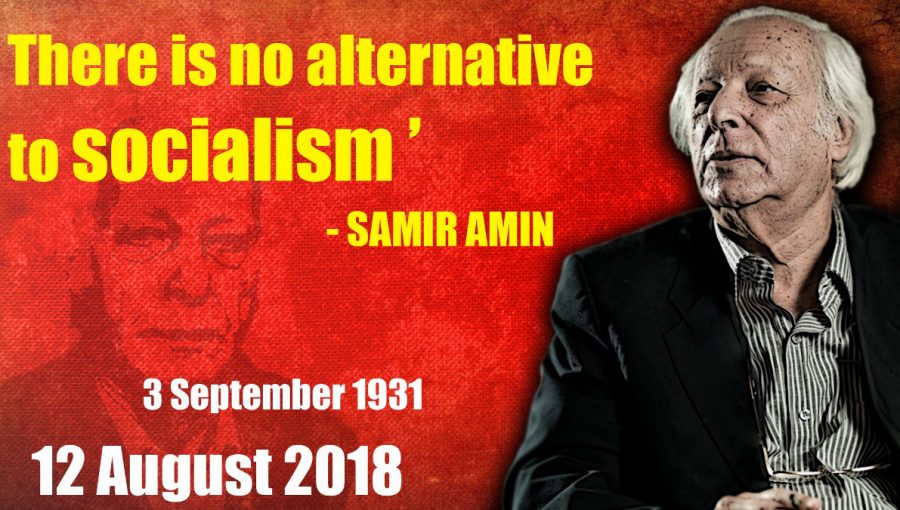Cementing Neo-Colonial Relations: the EU–Mercosur ‘Free’ Trade Deal
“EU and Mercosur leaders ignore the voice of the people to push forward with toxic deal,” declared the Stop EU-Mercosur campaign alliance, a coalition of more than 450 organisations from Latin America and Europe, including trade unions, farmers’ organisations, social movements, animal activists, and environmentalists. The alliance held a two-day meeting in Brussels on 17 and 18 July in parallel to the summit of EU leaders and leaders from the Community of Latin American and Caribbean States (CELAC), at which a conclusion of the highly controversial EU-Mercosur ‘free’ trade agreement was also discussed.
Around 80 representatives of Stop EU-Mercosur members from Latin America and Europe gathered in Brussels to discuss the problems with the proposed treaty, explore alternatives, and co-ordinate their strategies to stop that treaty from being concluded, ratified, and implemented. In this article, I will summarise my observations.
Speaker after speaker highlighted the EU’s double standards. While the EU emphasises the need for a green transition at home, its policies prevent Latin America from following a similar path. First, the EU-Mercosur treaty is supposed to secure European access to critical raw minerals such as lithium, essential for battery production and the shift to electric cars, despite the high levels of environmental pollution which come with the mining of lithium. Second, while the EU focuses on this shift to e-mobility, the treaty with the Mercosur countries intends to increase European exports of fossil fuel-based car models, combustion engines, and agricultural pesticides, which are themselves forbidden in the EU (Fritz 2022).

Double Standards and Colonial Policies
Most importantly, the intended EU-Mercosur treaty is an extension of former colonial policies. The exchange of processed technology-based goods from the EU including cars, car parts, and chemicals for primary commodities such as soy, bioethanol, and beef from Mercosur countries constitutes an asymmetrical trade relationship, a relationship of unequal exchange, which results in the deindustrialisation of Mercosur countries.
Twenty years of experience with these neoliberal free-trade agreements (FTAs), participants pointed out, have proven that these treaties do not result in development. Rather, the peripheral position of Latin American countries in the global political economy is further entrenched. Their development is subordinated to the requirements of the capitalist core.
The environmental impact of the treaty is devastating. It is well known that increasing exports of soy and beef drive deforestation especially, but not only, in the Amazon rainforest. Equally, the mining of lithium results in widespread pollution of water resources, creating huge ‘sacrifice zones’ that are uninhabitable for humans.
Not everyone in Europe is supportive of the treaty. While the car manufacturing and pharmaceutical industry lobby pushes hard for conclusion and ratification (Tansey 2022), European farmers, especially from small- and medium-sized farms, are worried. They cannot compete with industrialised agriculture, which is subject to fewer regulations than in Europe. [Seven reasons to Stop EU-Mercosur.]
Several European representatives of the transnational farmers organisation La Via Campesina were present at the meeting, and they were the ones who argued that all free trade agreements should be opposed full-stop. And they were the ones who made the concrete proposal of building alternatives around the principle of food sovereignty. The focus should be on producing good food for local people, not on producing export cash crops. A broader set of principles for an alternative to the EU-Mercosur agreement can be found on the website of the Seattle to Brussels Network.
Role of Trade Unions and Indigenous people
Trade unions were also present including representatives from the Italian CGIL, the French CGT, and the Dutch FNV. From Mercosur, especially the Brazilian CUT, had sent several people to the meeting. This ensured some focus on the problem of precarious employment resulting from free trade agreements (FTAs). At the same time, as the CGIL representative told me, unfortunately fewer and fewer trade unions are represented at this kind of broader civil society meeting, while the unions themselves were unable to organise something similar at the same time. The joint declaration by the International Trade Union Confederation – Americas and the European Trade Union Confederation does not reject closer trade relations between the two continents, but does insist that the interests of workers must be at the heart of any future agreement. Ensuring a broad alliance that includes social movements, environmental groups, Indigenous people as well as trade unions clearly remains a challenge.
Furthermore, the strategy meeting of the Stop EU-Mercosur alliance revealed the difficulties with raising the subject of free trade agreements as a controversial issue within the wider public. This had been possible in 2015 and 2016 in the struggle against the Transatlantic Trade and Investment Partnership. The EU-Mercosur agreement, by contrast, has received much less public attention so far. Importantly, it may be necessary to construct different discourses for different audiences. What works in Europe may not be appropriate in Latin America.
In the end, the EU-CELAC summit failed at making significant progress with the EU-Mercosur agreement. Brazilian President Lula rejected the EU request for an additional environmental chapter, raised concerns about the inclusion of public procurement, and asked instead for a re-opening of the negotiations, ensuring space for reindustrialisation measures in Brazil. And yet, the so-called modernisation of the EU-Chile and the EU-Mexico FTAs was pushed forward. They are a similar type of agreement as the intended EU-Mercosur agreement and they indicate the ongoing dangers. The EU will clearly continue to complete the deal. Splitting the EU-Mercosur agreement into the free trade part and the political part is the most imminent threat (Müller 2023). If that occurs, then the former would not require the ratification by the various national parliaments and thus be much more easily adopted and implemented.
“When we oppose the EU-Mercosur trade agreement, we are not crying, we are not complaining,” outlined Kretã Kaingang, the representative for Brazilian Indigenous people at the meeting. “We warn the rest of the planet about the changes which will affect us all. We teach humanity.” Indigenous people make up five per cent of the global population, but they are caring for 83 per cent of the world’s biodiversity. Clearly, Indigenous people have to be at the heart of any solutions to our crises. •
This article first published on the AndreasBieler blog.





